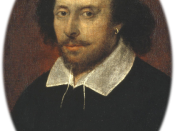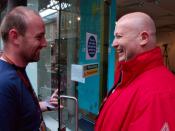A Royal Reflection: The final soliloquy of Richard II Richard's final soliloquy (Richard II, V.v.1-66) marks both the culmination of his transformation from a callous monarch to a poetic philosopher and his moral ascent resulting from his deposition as the King of England. In this scene, Richard is alone, in a prison cell at Pomfret Castle, for the first time in the play. This privacy enables him to reveal an enlightened, reminiscent eloquence nurtured and developed since being freed from the burdens and constraints that weighed him down as king. However, this soliloquy does more than reveal the inner workings of a poet-King.
Of the several functions and purposes that this soliloquy has, none may be more straightforward as its role in the establishment of the setting for the important death scene. From his first few lines, Richard indicates that he is alone, locked away in a prison cell, and isolated from all external influences.
Richard loosely summarizes the actions of the play, specifically Bullingbroke's usurpation of the throne and his own decline. Much of what he says foreshadows his imminent death. However, it is only in the face of death that Shakespeare reveals the nature of the former king. The most important role that this passage plays is to demonstrate the transformation that Richard has undergone since relinquishing the crown. He is no longer a callous, self-absorbed elitist, but is self-reflective and poetic. An early example of this clever use of language is the hammer metaphor, which symbolizes his newfound ability to craft words and sentences in a rich and meaningful manner, and sets his brain and soul to breed thoughts.
Despite having surrendered the crown to his cousin early in Act IV, the unmasking of Richard is not complete until he has been imprisoned for a...


